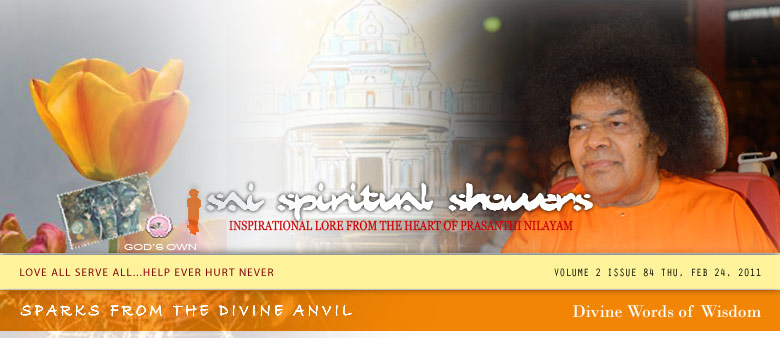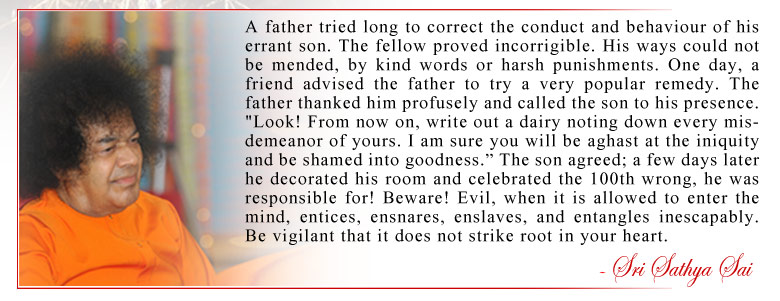 |
 |

Devotee: In the West, Sadhana is generally taken to be a process of self-improvement. But, that implies identification with the changing personality? Sri Sathya Sai: First, there may be the urge to self-improvement. But, the next stage is inquiry, the inquiry into the reality of `this' and `that'. Seven-tenths of Sadhana is ENQUIRY. Devotee: Sadhana as it is described, seems wrong, because it is a conscious effort aimed at getting a reward. It seems to me that Sadhana is real, only when it is spontaneous. That is to say, as when one naturally loves God. He cannot but help love God. And, he cannot help but make inquiry. Sri Sathya Sai: It is as you say; but, you have not experienced the spontaneous love for God. It is still just an idea. You have a conviction that love for God, exists naturally in you. That conviction itself is the result of many lives spent in spiritual practice. Devotee: I have the conviction so strong, that it is the very marrow of my bone that Life is One; that others, Swami, and myself are One. The Atma is that One and it is fully here at this moment; and I am, constantly engaged in Sadhana; so, the question remains: Why do I not actually experience, that Unity, as no other than myself? Sri Sathya Sai: Your conviction of Unity is an Idea, a Thought. It is not experience. For instance, when your wife has pain in the head, do you have it too? If not, where is the experience of the Unity? The Unity must be experienced, not just felt as an idea, or entertained as a thought. Devotee: Swami! If Sadhana and conviction do not bring the experience, how is one to get it? Sri Sathya Sai: Through steady Sadhana. Just as with ourselves now, in this car. We need concern ourselves only with the careful driving of the car; in due course, we will arrive at Anantapur, wouldn't we? With correct and steady Sadhana, the actual experience of the ONE will naturally come about. Devotee: How does one really experience that he is the same as another? Because now, one feels for another through compassion. Compassion is idea, understanding; it is not direct experience of unity. When some one hit a dog, Sai Baba of Shirdi had the bruises. That is the actual experience of Unity. Sri Sathya Sai: All is Divine. When you are firmly established in the fact of your Divinity, then, you will directly know that others are Divine. Compassion for others is felt so long as you consider yourself as a separate entity, as a consequence of the body consciousness. The story of Shirdi Sai Baba that you have heard about is not fully correct. The facts are: a lady cooked and got ready a plate of sweets for Baba, and a dog ate them. The lady drove the dog away, with blows. The lady then carried another plate of sweets to Baba, who refused them, saying that He had eaten the sweets she previously provided, and His hunger was satisfied. The lady pointed out that this was the first time that she was offering the sweets; so, how could he say to the contrary? Baba said, "No." You offered them and while I was eating them, you have also beaten Me." Thus, He gave a lesson that He was omnipresent and that there was only ONE Universal Life. Devotee: What does Swami mean by `omnipresent' Sri Sathya Sai: Omnipresent means everywhere, at the same time, all the time. Devotee: Swami says, that at a certain stage in Sadhana, the exterior nature ceases. How is that? Sri Sathya Sai: There are ten stages in Sadhana, each cognised by sounds of various types, ranging through different vibrations—bell, flute, conch, OM, thunder etc. The tenth stage is reached when the senses are transcended. Beyond the senses, it is the state of Bliss. Devotee: Is that State of Bliss experienced only for a time? What happens in the daily round of life? Sri Sathya Sai: That state remains always. Then, it is always Bliss. He thinks God, eats God, drinks God, breathes God, lives God. Devotee: Does every one pass through these ten stages? Sri Sathya Sai: No. One may go direct to the tenth, the transcendental state. Or, to stage six, or seven. Or not progress at all. It is not uniform for all. Devotee: What should be one's attitude to these stages in Sadhana, as one encounters each stage one by one? Sri Sathya Sai: The states change, but, the `attitude' should be unchanging. Devotee: But, what value should one give to the various states? Sri Sathya Sai: The Sadhaka will not be satisfied, with any of the states. For, complete union is the goal. Desire remains strong, until the transcendental bliss is realised, and then, desire ceases. At that state, all is God. Thoughts, desires, all are God. Devotee: These thoughts that stream through the mind, are they material? Sri Sathya Sai: Yes. They are matter. All matter is impermanent. Devotee: Where do thoughts come from? Sri Sathya Sai: They come from food and environment. If you have satwic food and desire only for good things and atmosphere around you, good thoughts only will come. Devotees: Where do thoughts go? Sri Sathya Sai: They go no place. Because, thoughts do not flow through the mind. The mind goes out and grasps, and gets engaged with thoughts. If the desire is for God, the mind does not go out. The best way is not to get involved in the problem, 'How to get rid of thoughts?' See all thoughts as God. Then, only God thoughts will come. The entire mechanism of body, mind, intelligence, will work in a coordinated manner, for the benefit of the higher goal. Devotee: Then, for whom should the entire mechanism be functioning? Sri Sathya Sai: For the Atma. A small example: The earth turns on its own axis, but, at the same time, it is revolving around the Sun. The various faculties of man should do their own work, but, the Atma is the center of their Universe. Devotee: Swami! How can one bring these faculties under the control of the Atma? Sri Sathya Sai: When one realises that the Atma is the Reality, the ONE, then, everything will function smoothly. It is a question of surrendering all to the Atma. Devotee: But, Swami has said, we should ask ourselves, "Who am I that I dare talk of surrendering my mind and intelligence to God? They do not belong to me. How can I surrender that which I do not own, and cannot even control?" Sri Sathya Sai: It is not a question of surrendering or giving to some other one. One surrenders to oneself. Recognition that the Atma is one self is surrender. Devotee: Then, Swami means, that surrender is really a putting aside of that which one perceives as incorrect or false. Sri Sathya Sai: Yes. Devotee: I now understand. "Surrender" implies a person offering himself or his possessions to another person. But, really, it is more like the abandoning of ideas and concepts for which one has no further use, or which one sees as inadequate or wrong. Sri Sathya Sai: Yes. |
 |